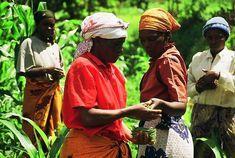
Senegal exports some 10,500t of fruits and vegetables to the EU every year, most of which are destined for the French, Belgian and Dutch markets.
With nearly 6,000t dispatched annually, green beans contribute the lion’s share of the country’s exports to Europe. Over the past few years the country has tried to diversify the range of produce it exports. But even though about 2,700t of cherry tomatoes and 1,600t of mangoes are exported, these crops remain secondary to green beans, the country’s prime export. Asparagus and courgettes are also exported from time to time, but on an irregular basis. However, efforts are being put into expanding the sector’s export potential.
The horticultural sector in Senegal is characterised by two different types of production systems. The first consists of the large exporting companies, which have their own production centres and account for just over half of the country's horticultural products. The other is based on a number of small- and medium-sized exporters who rely on the production of outgrowers, but who may also have some production of their own.
The sector as a whole is represented by two sets of professional organisations - horticultural producers, who come under regional banners, and other professional organisations representing exporters.
The Senegalese horticulture industry is currently undergoing a tough time. Not only is it faced with strong competition from other African producers in European markets, but perhaps more importantly, it is having to deal with increasingly stringent European regulations on food safety and traceability. The challenge is a sizeable one for the industry.
To help the horticulture sector of ACP (African, Caribbean and Pacific) countries cope with Europe’s changing food quality and safety regulations, the European Union has set up the Pesticides Initiative Programme (PIP). Managed by COLEACP, the international network of professionals in the ACP-Europe horticultural industry, PIP experts regularly visit participating ACP countries to discuss strategies companies could adopt in light of changing EU regulations. As of February 2004, eight companies from Senegal had signed a memorandum of understanding with PIP.
One such company is Niram Maraîcher. It is a small horticultural company that exports about 300t of produce to the European market, mostly extra fine green beans, melons and mangoes. The general manager of the company, Yasmine Hachem, knows that if she wants to continue exporting to the EU, her company will have to comply with the maximum residue limits (MRLs) imposed by the European Union. However, to do that, she says, “our staff needs to know which pesticides to use and under what conditions to use them. But they continue to lack adequate training."
This is where PIP comes in. After many ACP companies indicated that their workers did not have the proper qualifications to comply with EU regulations, PIP set up a comprehensive training programme designed to train staff from middle-managers (quality control managers, production managers, etc.) to outgrowers on food safety and traceability management issues. The training PIP offers comes in two forms, either through collective training workshops or through more hands-on training sessions on companies’ premises.
Last year saw the pilot phase of PIP’s training programme and a number of collective workshops were held in ACP countries. One such workshop was held in Senegal’s capital, Dakar, and gathered company representatives and professional organisations from the French speaking countries of Côte d’Ivoire, Cameroon and Senegal.
A number of in-company training sessions have also been held in the country for companies like Niram Maraîcher, SEPAM, and Safina. These sessions covered such topics as pest identification, choosing pesticides, stocking pesticides, and implementing security measures during the application of pesticides, among others.
In addition to receiving help to train their staff, companies who have signed a memorandum of agreement with PIP can also request assistance in implementing traceability systems. In Niram Maraîcher’s case, a local computer expert was contracted to help the company implement a computerised traceability system. Other Senegalese companies are to follow suit.
"With the help of PIP experts we have been able to adapt the working methods of our company with a view to adopting good practice," mentions Hachem. Adapting company practices not only means having qualified and trained staff, but it also means knowing the acceptable dosage of pesticides that can be applied on crops to comply with European MRLs. To this end, PIP has drawn up crop protocols that specify which pesticides and which dosage should be used for a particular crop.
PIP has completed a number of crop protocols, namely for green beans, cherry tomatoes, pineapples, papayas and avocado. As crop protocols are constantly evolving and adapted to reflect changing crop data as well as new pesticides and regulations, PIP regularly conducts field trials.
These trials enable experts to analyse the level of residues of a given pesticide found in fruit and vegetables at various stages of their growth process. Based upon their results, the crop protocols are revised as required to achieve compliance with EU MRLs without threatening the efficiency of the pesticide. Several such trials have taken place in Senegal, especially in regard to green beans and cherry tomatoes.
In light of the programme’s encouraging results, other Senegalese companies - such as Soleil Vert - have expressed an interest in receiving PIP support. Soleil Vert’s general manager Christophe Marrucci says: "We have already invested heavily to modernise our infrastructure.
“But it is clear that the support of experts such as PIP would enable us to be better informed on the evolution of European regulations and to train the technicians and others who work with us. I think that if we do not conform with European requirements, we will not be able to export any more. We do not have the choice; it is necessary to react quickly."






No comments yet